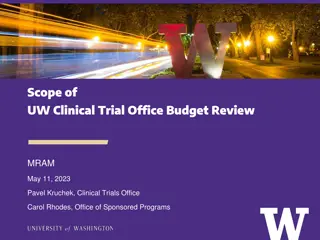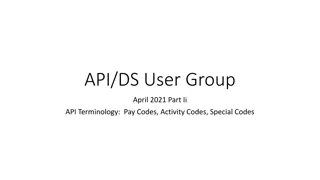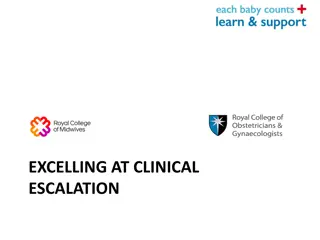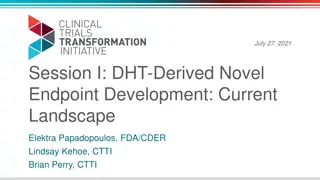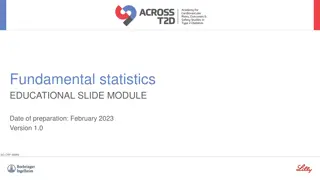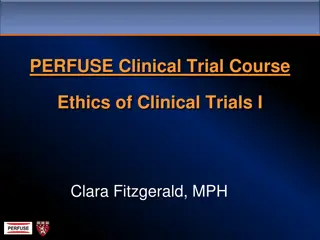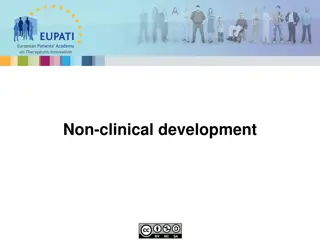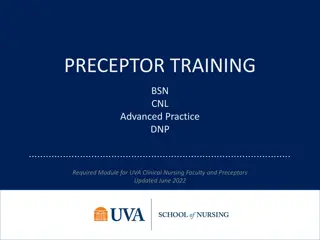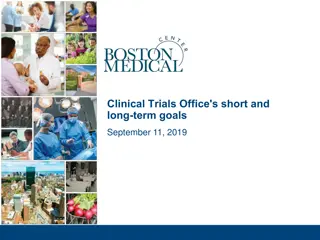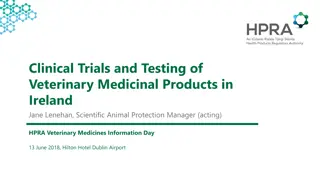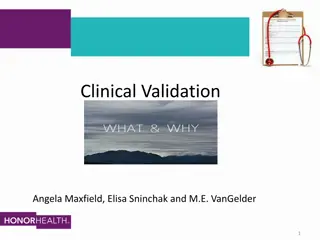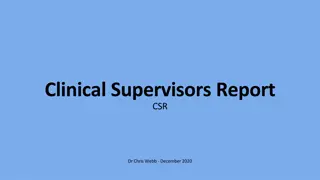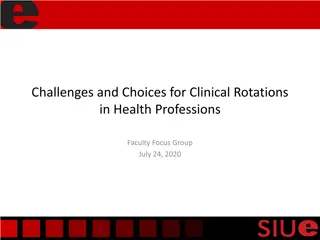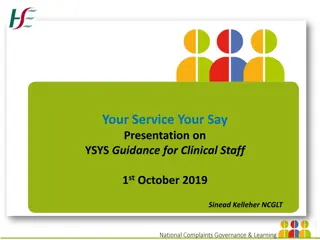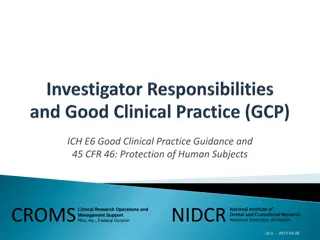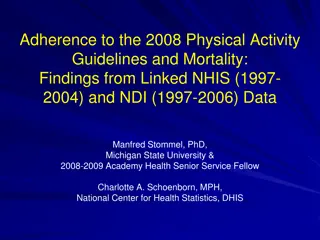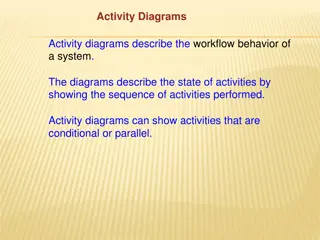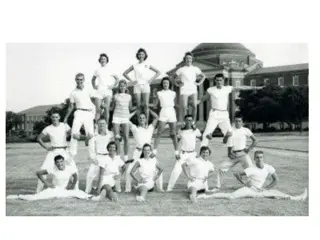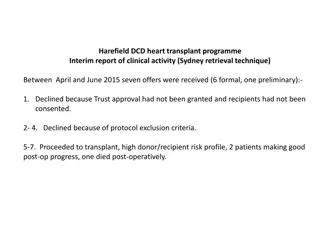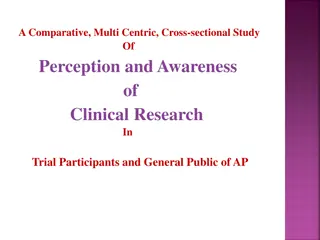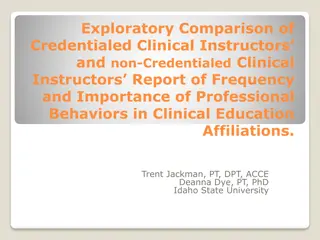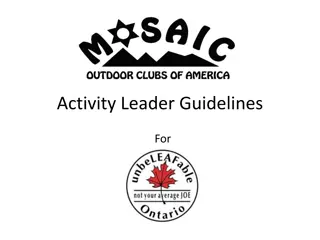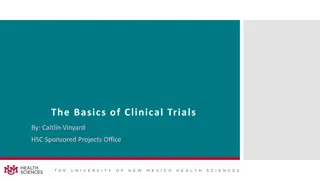Modeling and Generation of Realistic Network Activity Using Non-Negative Matrix Factorization
The GHOST project focuses on the challenges of modeling, analyzing, and generating patterns of network activity. By utilizing Non-Negative Matrix Factorization (NMF), realistic network activity patterns can be created and injected into live wireless networks. Understanding and predicting user behavi
4 views • 28 slides
Overview of UW Clinical Trial Office Budget Review
UW Clinical Trial Office conducts budget reviews to ensure compliance and financial accountability in clinical trials. The office collaborates with various departments to manage billing compliance, financial risks, and institutional policies. The primary focus is on avoiding patient billing errors,
0 views • 17 slides
India Alliance Clinical & Public Health fellowship in India
India Alliance Clinical & Public Health fellowship in India\n\nIndia Alliance Clinical and Public Health Research Fellowships are for Health researchers with an MD, MS, MPH, or an equivalent clinical or public health degree, who can apply for the DBT\/Wellcome Trust India Alliance Clinical and Publi
0 views • 5 slides
FDA Perspective on Epidemiological Cut-off Values (ECVs)
The FDA presents insights on the development and use of Epidemiological Cut-off Values (ECVs) to distinguish wild-type populations from those with acquired resistance mechanisms. ECVs are crucial for determining antimicrobial susceptibility and guiding treatment decisions. The process involves analy
0 views • 13 slides
Understanding Activity, Pay, and Special Codes in API Terminology
Dive into the terminology surrounding Activity Codes, Pay Codes, and Special Codes within the realm of APIs. Explore how these codes represent different aspects of scheduling, productivity, and payroll management. Gain insights into the distinctions between Activity Codes and Pay Codes, their implic
5 views • 8 slides
Clinical Escalation: Building Effective Communication in Maternity Units
Exploring the importance of clinical escalation in maternity units, this session outlines the components and practices involved in identifying, communicating, and acting upon clinical concerns. It emphasizes recognizing deviation from normality, effective communication, and taking appropriate action
0 views • 27 slides
Training Models in Clinical Psychology: A Comprehensive Overview
Clinical psychology training models such as the Scientist-Practitioner Model have evolved over the years to integrate science and practical expertise. The Scientist-Practitioner Model, originating in 1949, emphasizes the fusion of scientific knowledge and clinical application. It faced criticism for
1 views • 98 slides
Ethical Issues in Clinical Pharmacy Research by Dr. Haider Raheem Mohammad
Research ethics play a crucial role in clinical trials and therapeutic research in the field of pharmacy. From discovery to validation, all medicines undergo rigorous evaluation processes to ensure safety, efficacy, and freedom from adverse effects. Clinical trials in both animals and humans are ess
0 views • 20 slides
Advanced Clinical Practice Framework and Pillars of Practice
The document discusses the advanced clinical practice framework and the four pillars of practice which include leadership & management, clinical practice, education, and research. It emphasizes the importance of core capabilities and area-specific competence in advanced clinical practice. The role o
2 views • 8 slides
Digital Health Technology-Derived Clinical Outcome Assessments in Regulatory Decision-Making
This session discusses the landscape of DHT-derived novel endpoints in clinical research, focusing on considerations for regulatory decision-making. It explains the use of digital health technology in clinical outcome assessments and highlights the potential benefits of digitally collected COAs, suc
0 views • 42 slides
Objective Structured Clinical Examination (OSCE): A Modern Approach to Assessing Clinical Competence
The Objective Structured Clinical Examination (OSCE) is a modern examination method widely used in the field of health science to evaluate clinical skill performance. It involves stations where medical students interact with simulated patients to demonstrate competencies such as history taking, phys
1 views • 40 slides
NIMH Clinical Research Education and Monitoring Program Overview
NIMH's Clinical Monitoring and Clinical Research Education, Support, and Training Program (CREST) aims to ensure the proper conduct, recording, and reporting of clinical trials. This program includes clinical monitoring plans, guidelines for site monitoring activities, and independent clinical monit
1 views • 29 slides
Understanding Water Activity and Mass Transfer in Food Engineering
Water activity (aw) plays a crucial role in microbial activity, chemical and physical changes in foods, and the dehydration process. Maintaining water activity below specific levels can prevent microbiological spoilage and deterioration reactions, while also affecting texture, aroma, and overall qua
0 views • 11 slides
Understanding Statistical Methods for Clinical Endpoints in Diabetes Research
This educational slide module delves into fundamental statistics for analyzing clinical endpoints in diabetes research. It covers the choice of statistical methods, the distinction between statistical and clinical significance, and the importance of different endpoints in evaluating clinical benefit
1 views • 37 slides
Understanding Ethics in Clinical Trials: A Comprehensive Overview
Explore the historical context, important ethical guidelines, and the ethical framework with 7 principles in the field of clinical trials. Learn about key trials, ethical considerations, and guidelines governing human subject research in clinical medicine. Delve into the critical aspects such as inf
1 views • 15 slides
Understanding Non-Clinical Development in Therapeutic Innovation
The European Patients Academy on Therapeutic Innovation focuses on the non-clinical development phase of medicine, delving into efficacy assessment, safety evaluation, and manufacturing process considerations. Non-clinical studies are essential for decision-making in clinical trials, marketing appli
1 views • 26 slides
UVA Clinical Nursing Preceptor Training Regulations
Virginia Board of Nursing regulations outline the role of clinical preceptors in supervising nursing students, ensuring safe client care, and enhancing clinical learning experiences. Preceptors serve as teachers, mentors, and role models, linking classroom knowledge with practical skills. Faculty me
0 views • 36 slides
Importance of Communication and Counseling Skills in Clinical Settings
Dr. Leena Baghdadi, an Assistant Professor and Clinical Epidemiologist, emphasizes the significance of effective communication and counseling skills in clinical practice. The content discusses the objectives of understanding these skills, barriers, and practical examples of counseling. Highlighted b
0 views • 27 slides
BMC Clinical Trials Office Goals and Initiatives
The BMC Clinical Trials Office (CTO) is dedicated to supporting clinical and human research at Boston Medical Center by providing leadership and expertise in research, finance, and administration. The CTO reviews, negotiates, and approves protocols, supports grants and contracts, ensures accurate cl
0 views • 17 slides
Understanding Clinical Trials: Types and Designs
Clinical trials are essential research studies that evaluate new tests and treatments to improve human health outcomes. They involve various phases, designs, and purposes, such as treatment trials, prevention trials, and observational studies. Different types of clinical trial designs include experi
7 views • 18 slides
Veterinary Medicinal Products Clinical Trials in Ireland
This presentation covers the process and regulations surrounding clinical trials and testing of veterinary medicinal products in Ireland. Topics include the application process, HPRA evaluation, fees, scope of legislation, and the purpose of clinical trials. Feedback from a 2016 HPRA survey on clini
3 views • 17 slides
Understanding Clinical Validation and DRG Validation in Healthcare
Clinical validation ensures that diagnoses documented in a patient's record align with accepted clinical criteria, while DRG validation focuses on matching hospital-coded information with physician descriptions and patient records. Clinical validation involves a review by clinicians to confirm the p
1 views • 39 slides
Dr. Chris Webb's December 2020 Clinical Supervisors Report
A structured Clinical Supervisors Report (CSR) for Dr. Chris Webb in December 2020. This report provides insight into the clinical supervision process within various posts and includes valuable information from the Clinical Supervisor.
0 views • 26 slides
Understanding Evidence-Based Medicine and Clinical Decision-Making
European Patients Academy on Therapeutic Innovation emphasizes the importance of Evidence-Based Medicine (EBM) in providing optimum clinical care. EBM involves systematic review and utilization of clinical research for informed decision-making, benefiting patients in disease management and treatment
7 views • 20 slides
Navigating Challenges in Clinical Rotations for Health Professions Faculty
This presentation highlights the challenges and choices faced by health professions faculty in clinical rotations, focusing on identifying opportunities and resources for limited clinical experiences. The content covers fundamental terminology, options available, and strategies such as on-site and r
1 views • 18 slides
Essential Aspects of the Clinical Interview in Psychology
Clinical interviews play a crucial role in the assessment conducted by clinical psychologists, showcasing essential qualities like validity, reliability, and clinical utility. Understanding the importance of feedback and honing general and specific skills as an interviewer are key components in cond
1 views • 17 slides
Comprehensive Guidance for Clinical Staff on Complaints Handling Process
Developed for clinical professionals, this guidance provides support for participating in complaints investigations and writing clinical reports. It aims to clarify the definition of clinical judgment and outlines the key elements of handling complaints effectively. The module encourages collaborati
0 views • 19 slides
Clinical Research Guidelines and Regulations Overview
Clinical research encompasses various guidelines and regulations to ensure the protection of human subjects and the credibility of study results. Key aspects include Good Clinical Practice (GCP) standards, Title 45 of the Code of Federal Regulations (CFR) Part 46, and additional CFR sections for cli
0 views • 46 slides
Ohio Clinical Alliance: Transforming Clinical Experiences
The Ohio Clinical Alliance, through collaborative partnerships, aims to enhance clinical preparation for educators. The leadership team comprises various representatives and organizations committed to improving student learning. Their activities include retreats and meetings to ensure effective comm
0 views • 27 slides
Adherence to 2008 Physical Activity Guidelines & Mortality Study
This study explores the association between adherence to the 2008 Physical Activity Guidelines for Americans and all-cause mortality. It analyzes data from the NHIS and NDI to assess the risks associated with aerobic and muscle-strengthening activities. The primary objective is to evaluate mortality
0 views • 29 slides
Understanding Activity Diagrams and State Chart Diagrams
Activity diagrams describe the workflow behavior of a system by showing the sequence of activities performed, including conditional and parallel activities. Elements such as Initial Activity, Symbol Activity, Decisions, Signals, Concurrent Activities, and Final Activity are depicted in these diagram
0 views • 10 slides
The Evolution of Cheerleading: From Yelling to Intense Physical Activity
Cheerleading ranges from yelling to intense physical activity, incorporating tumbling, dance, jumps, cheers, and stunting to motivate sports teams and entertain audiences. Originating in the United States, it has evolved from an all-male activity to a predominantly female sport with some co-ed teams
0 views • 9 slides
Virginia High School Survey 2015 Youth Risk Behavior Results
The Virginia High School Survey 2015 presented data on various risky behaviors among students, including seat belt usage, alcohol and drug consumption, weapon carrying, suicide attempts, physical activity, sexual activity, and more. The results are divided into percentages of students engaging in th
0 views • 4 slides
Interim Report of Harefield DCD Heart Transplant Programme Clinical Activity
The interim report highlights the clinical activity of the Harefield DCD Heart Transplant Programme, showcasing the feasibility of DCD heart transplantation using various methods. The report discusses donor/recipient risk profiles, feedback from medical teams, and the potential impact on national tr
0 views • 7 slides
Perception and Awareness of Clinical Research in Trial Participants and the Public of Andhra Pradesh
This study focuses on understanding the perception and awareness of clinical research among trial participants and the general public in Andhra Pradesh. It highlights the importance of creating awareness about clinical research, previous study results, public attitudes towards clinical trials, and e
0 views • 24 slides
Understanding Factors Affecting Enzyme Activity in Biochemistry
Enzyme assays measure substrate conversion to product under varying conditions like cofactors, pH, and temperature. Enzyme velocity represents the rate of a catalyzed reaction, typically reported as V0. Enzyme activity is expressed as mol of substrate transformed per minute, with enzyme unit and kat
0 views • 18 slides
Comparison of Professional Behaviors in Clinical Education
Professional behavior characteristics play a crucial role in enhancing student learning during clinical education. This study examines the differences in reported importance and frequency of professional behaviors between credentialed and non-credentialed clinical instructors. The background outline
0 views • 28 slides
Enhancing Clinical Academic Collaboration Between Universities and NHS Trusts
Clinical academics play a crucial role in integrating clinical practice, research, and education within the NHS. Collaboration between universities and NHS trusts is key to ensure clinical academics address the right questions for patient care and societal benefit. Challenges include an aging clinic
0 views • 29 slides
Activity Leader Guidelines for Volunteers
Welcome to the role of a leader, driver, or bus captain! As a leader, it is essential to familiarize yourself with the provided leader packets, understand the details of the activity, and prioritize safety. Taking pride in being a leader, owning the activity before the event, ensuring your packet is
0 views • 25 slides
Understanding Clinical Trials: Phases, Types, and Definitions
Clinical trials play a crucial role in advancing medical research and treatment options. This comprehensive guide covers the basics of clinical trials, including their definition, phases, types, and key definitions like IND, IDE, NDA, and more. Discover how different phases of trials work, the vario
0 views • 16 slides

